Key takeaways:
- Storytelling, open-ended questions, and quizzes are effective techniques for enhancing audience engagement during presentations and workshops.
- Quizzes promote interactive learning, provide instant feedback, strengthen social bonds, and add a fun element to the learning process.
- Effective quiz design involves clear questions, variety in formats, relatable content, and visually appealing layouts to enhance engagement.
- Promotion through social media, email marketing, and collaborations with influencers can significantly increase quiz participation and reach.
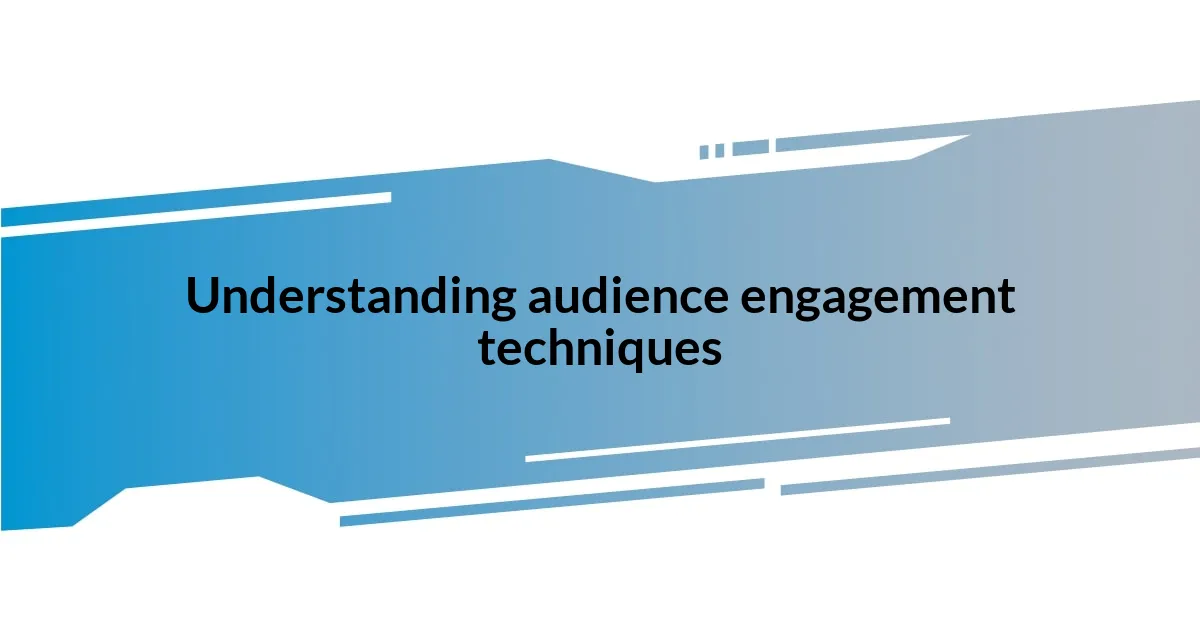
Understanding audience engagement techniques
One of the most fascinating techniques for engaging an audience is the power of storytelling. I remember the first time I observed this during a webinar; the host shared a personal story that tied directly to the content. It wasn’t just informative; it made me feel connected and invested. Don’t you think stories have a unique way of touching our emotions?
Another effective engagement technique is asking open-ended questions to prompt discussion. I often do this in workshops, and it transforms the atmosphere. Suddenly, the participants become part of the conversation rather than passive listeners. Have you noticed how asking for opinions can ignite enthusiasm?
Utilizing quizzes is another dynamic way to engage audiences. I’ve seen firsthand how a simple quiz can change the pace of a session; people light up when they can test their knowledge. It’s not just about answering questions; it’s about creating a shared experience. Think about it: when was the last time a quiz made you feel energized and involved in a topic?
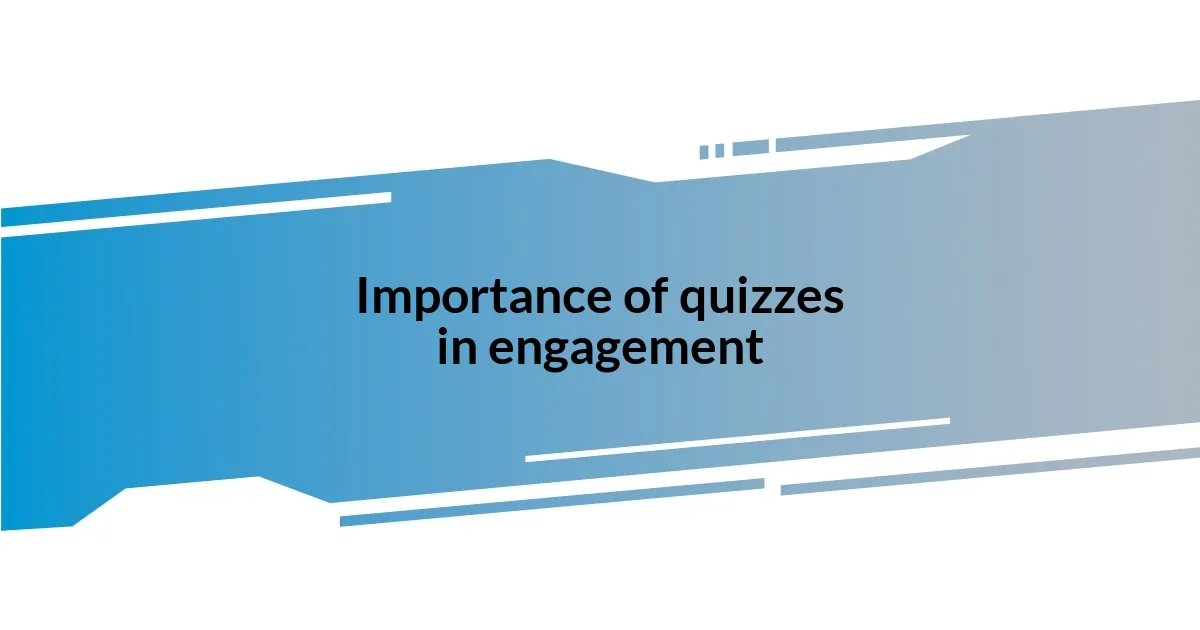
Importance of quizzes in engagement
When it comes to audience engagement, quizzes hold a special place in my heart. I’ve often used them as icebreakers in my workshops, and the difference is palpable. It’s incredible to witness those initial moments of hesitation transform into lively conversations, with participants eagerly sharing their thoughts. Quizzes do more than just test knowledge; they spark curiosity and encourage participation.
Here are a few reasons why quizzes are so impactful for engagement:
- Interactive Learning: Quizzes create an environment where learning is active, not passive.
- Instant Feedback: Participants receive immediate results, promoting discussions and reflections.
- Social Bonding: Shared experiences through quizzes can strengthen connections among participants.
- Fun Factor: The competitive nature of quizzes often adds an element of enjoyment that motivates learners.
I remember a session where I implemented a quiz on a rather dry topic. The energy in the room shifted dramatically. People were smiling, laughing, and even playfully debating the answers. It reminded me that engagement doesn’t have to be serious; it can be enjoyable and memorable. Quizzes were the catalyst that transformed that session into a powerful and interactive experience.
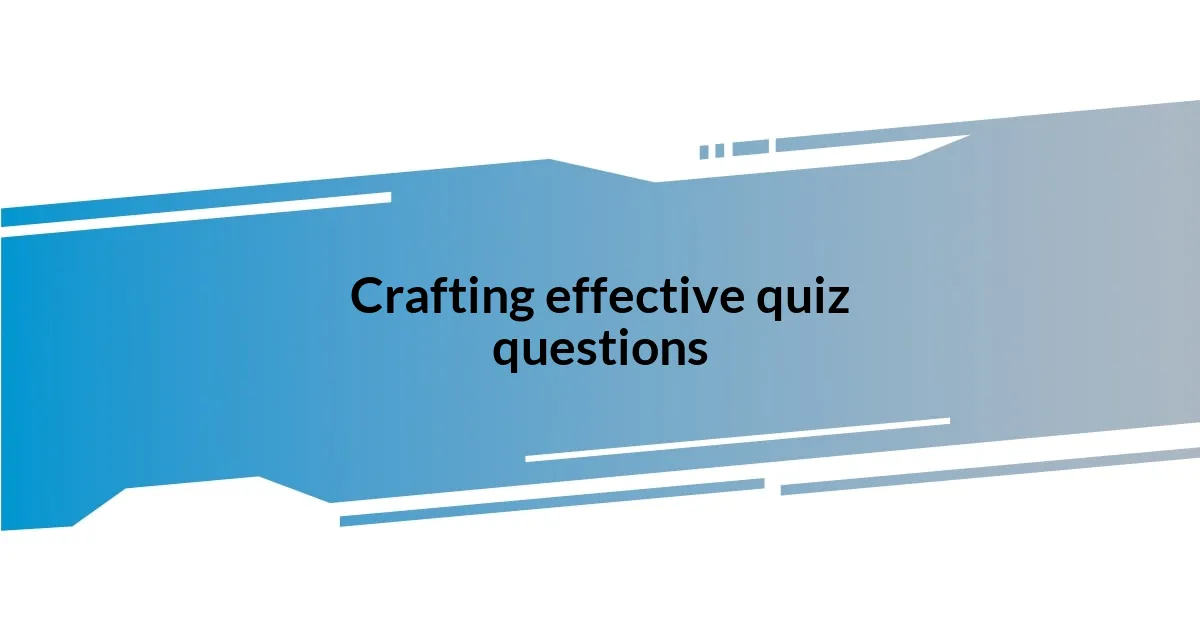
Crafting effective quiz questions
Crafting effective quiz questions requires a thoughtful approach to ensure they not only gauge knowledge but also engage and motivate participants. From my experience, well-crafted questions should be clear and concise, avoiding ambiguous language. I once crafted a question that ended up being too complicated; it left my audience frustrated rather than engaged. The right balance of challenge and clarity can transform the quiz into a fun learning experience.
Another critical element is variety. Mixing question formats—like multiple-choice, true/false, and open-ended—keeps participants interested. I’ve had times when I introduced a mix of question styles in my quizzes, and the energy in the room skyrocketed. It’s fascinating how a simple change can reignite engagement levels, drawing everyone into the quiz.
Lastly, including relatable content can turn a standard quiz into a personal experience. I often draw examples from everyday life or current trends that resonate with the audience. During a recent quiz focused on industry knowledge, I included questions about popular recent events in our field. The responses were not just correct or incorrect; they sparked lively conversations, showcasing the power of relatability in quiz questions.
| Question Type | Engagement Level |
|---|---|
| Multiple Choice | Moderate |
| True/False | High |
| Open-Ended | Very High |
| Image-Based | High |
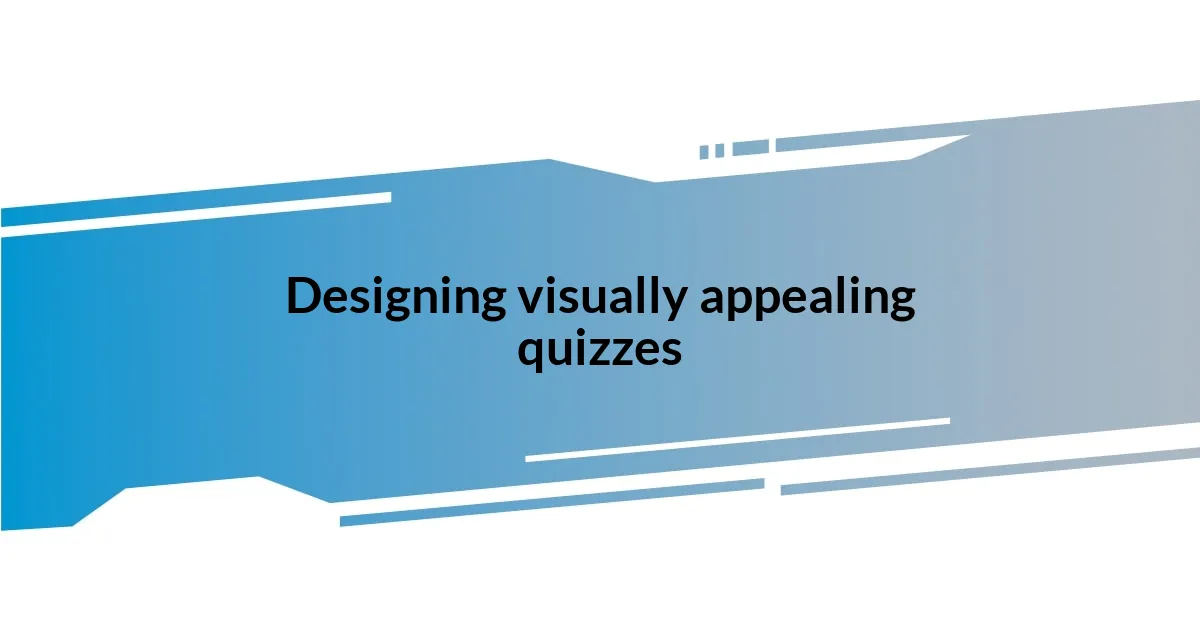
Designing visually appealing quizzes
Designing visually appealing quizzes is more than just adding colors and images; it’s about creating an immersive experience. I once designed a quiz with a vibrant theme, using contrasting colors and engaging graphics that complemented the questions. The response was overwhelmingly positive; participants remarked that the visual appeal drew them in. It’s amazing how a well-thought-out design can elevate the quiz from a mere test to a visually stimulating adventure.
Incorporating images and icons can also enhance understanding and retention. For instance, during a quiz about marketing trends, I used relevant visuals alongside questions, turning abstract concepts into concrete images. These visuals not only captured attention but also sparked conversations about the topics referenced, illustrating how sight can enhance understanding. Have you ever noticed how a striking image can steal your focus?
Effective layout matters too; it guides participants through the quiz smoothly. I aim for a clean, organized format that makes navigation intuitive. Once, I had a quiz that was cluttered and chaotic, and I witnessed the frustration on the participants’ faces. After I simplified the layout, the atmosphere shifted—people were more relaxed and eager to engage. A visually appealing quiz, in my experience, acts like a friendly host that invites participants to linger and explore, rather than one that overwhelms them.
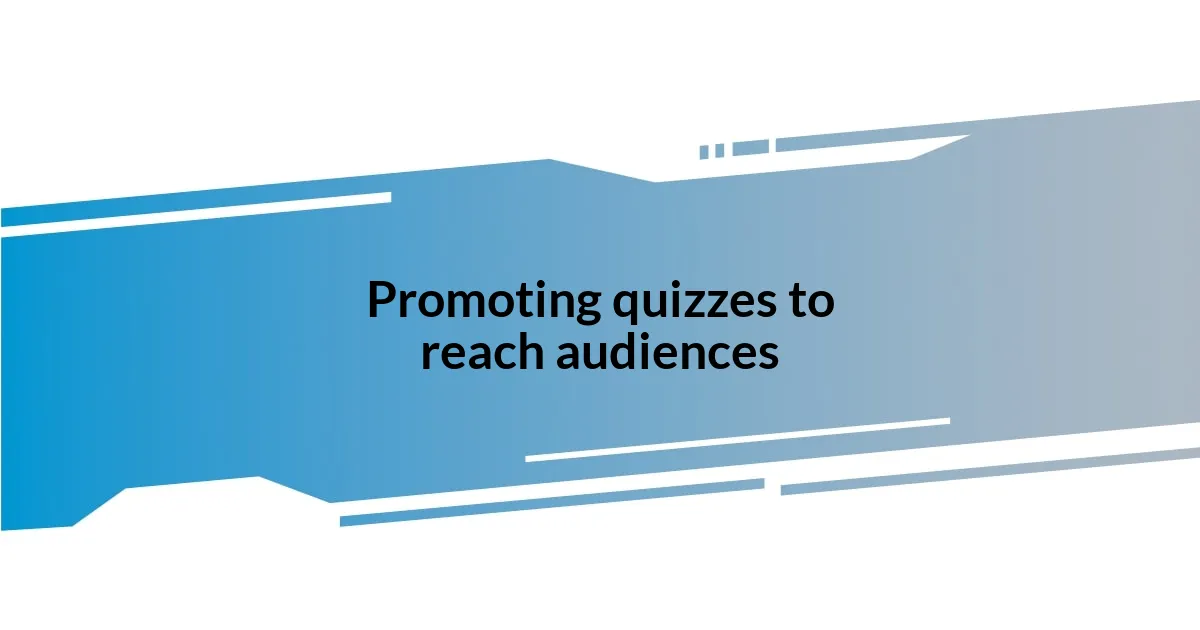
Promoting quizzes to reach audiences
Promoting quizzes is essential for reaching a wider audience and sparking their interest. In my experience, sharing quizzes on social media platforms has proven to be incredibly effective. I remember launching a quiz on Instagram, where I used engaging captions and eye-catching stories. The interaction was phenomenal! It felt so rewarding to see the quiz shared among friends, resulting in a wave of new participants eager to join in.
Email marketing is another powerful tool. I’ve crafted targeted emails that not only included a direct link to the quiz but also highlighted what participants would gain from taking it. A while back, I sent out a quiz related to professional development, promising valuable insights as feedback. The response rate was much higher than I anticipated, and it’s a reminder of how a compelling invitation can draw people in. Are your emails enticing enough to pique curiosity?
Lastly, collaborating with influencers or relevant community leaders can amplify your reach drastically. I had the opportunity to partner with a popular local figure for a niche quiz, and their endorsement was invaluable. The buzz generated wasn’t just about numbers; it felt like a community coming together to share knowledge and have fun. When audiences see someone they admire engaging with your content, it creates an authentic connection that drives participation. Have you ever considered who in your network could elevate your quizzes?

Analyzing quiz results for insights
When it comes to analyzing quiz results, the data can be a treasure trove of insights. I recall a time when I dissected the responses to a personality quiz I created. The patterns that emerged showed me not only which questions resonated with people but also the common traits they were curious about. It made me wonder, have you ever looked at responses and discovered something unexpected?
Digging deeper into the results provides even more valuable context. For instance, I recently analyzed a quiz about work preferences. The answers revealed a stark divide in how individuals like to collaborate—some thrived in team environments while others preferred solitary work. This realization inspired me to tailor future quizzes to address these different preferences more directly, enhancing engagement. Isn’t it fascinating how the smallest tweaks can lead to a more tailored experience for your audience?
Looking beyond just the numbers, I find that feedback plays a crucial role in refining quizzes. After a quiz about lifestyle habits, I received comments that prompted me to add more interactive elements in future editions. People wanted more than just results; they craved engaging discussions and expanded insights. Isn’t that what we’re all after—a deeper connection through the quizzes we create? Analyzing results isn’t just about stats; it’s about understanding the human experience behind the answers.
